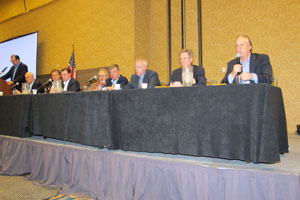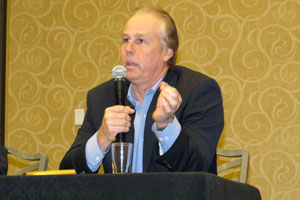
 At almost every Collision Industry Conference (CIC), heavy emphasis is put on the need for collision repair facilities to get the proper training and equipment and gain access to OEM repair procedures in order to properly and safely repair modern vehicles. The CIC held Nov. 2-3 at the SEMA Show in Las Vegas was no exception.
At almost every Collision Industry Conference (CIC), heavy emphasis is put on the need for collision repair facilities to get the proper training and equipment and gain access to OEM repair procedures in order to properly and safely repair modern vehicles. The CIC held Nov. 2-3 at the SEMA Show in Las Vegas was no exception.
A panel discussion by the Education and Training Committee addressed how changes in technology will affect the collision repair industry. It was moderated by Scott Biggs of Assured Performance Network, and panel members included:
• Chris Andreoli, Progressive
• Steve Nantau, Ford
• Bob Keith, CARSTAR
• Randy Hansen, Allstate
• Chris Evans, State Farm
• Doug Craig, Chrysler
• Rollie Benjamin, ABRA Auto Body & Glass
• John Van Alstyne, I-CAR
CARSTAR’s Keith kicked things off by citing the advanced metals such as high strength and ultra high strength steels appearing in cars today as one reason shops need updated tools, equipment and training to avoid liability.
"We may not have done something intentionally," Keith said, referring to performing an improper repair. "But we need to do the right thing for the customer and avoid negligence, especially if we want to be in business down the road."
Benjamin said his ABRA stores have been investing in higher levels of training, equipment and tools, but wondered aloud if shops will be getting an "early warning" from OEMs as to what technology is coming down the road so shops can be proactive in seeking the training they need.
Ford’s Nantau offered some frank perspective from the OEM side, stating that their main focus is to sell vehicles.
"Repairability comes way down on the list," said Nantau. "There is a major effort to reduce the cost of ownership. For example, bolt-on parts versus welding. You will see a lot more parts that can’t be repaired because of the reduced weight in vehicles. This doesn’t mean they won’t be repairable, just that the repair cost will be less."
Doug Craig of Chrysler said he wasn’t even sure, in some cases, if repairs could be done right even with the right training and equipment.
"Here is the reality: laser-brazed roofs. You cannot do that in the field, so will a vehicle truly be returned to pre-loss condition?" said Craig. "OEMs need to offer more direction on the proper procedures to fix cars. How intrusive does the repair need to be to restore a car’s crashworthiness?"
Nantau noted that while most shops spend 20 percent of their time writing the estimate and 80 percent on the actual repair, the need now is for 80 percent of the time to be spent on building a "repair plan."
CARSTAR’s Keith agreed: "There has got to be a culture change. Once you have a complete pre-repair process, it’s just manufacturing at that point. Owners and managers need to audit and control quality. And if I as an owner don’t sit in the same training class as my tech, I can’t audit that process. If we don’t repair these metals right, there will be catastrophic failure, not a little intrusion here or there."
Those "new metals," in Chrysler’s case, will be limited to steel and aluminum, said Craig.
"Carbon fiber? No," he said. "But maybe that will change in 10 years."
ABRA’s Benjamin said that being able to access OEM repair procedures electronically at a moment’s notice is critical to properly repairing today’s vehicles.
From the insurance side, State Farm’s Chris Evans said they are not in "crisis mode" yet as far as dealing with the cost to repair these sophisticated vehicles.
"Technology has always been commensurate with time," Evans said. "We have the data to look at these high-tech vehicles to see what they cost. And consumers will pay for it. But it’s our job to be quick to evolve and rise to the challenge."
Allstate’s Hansen reinforced the insurer’s role in the collision repair experience.
"We appraise cars and pay for them," said Hansen. "Lives are at stake here. But we need to repair cars quickly. There are lots of things that come into play as far as how we ultimately serve our customers."













